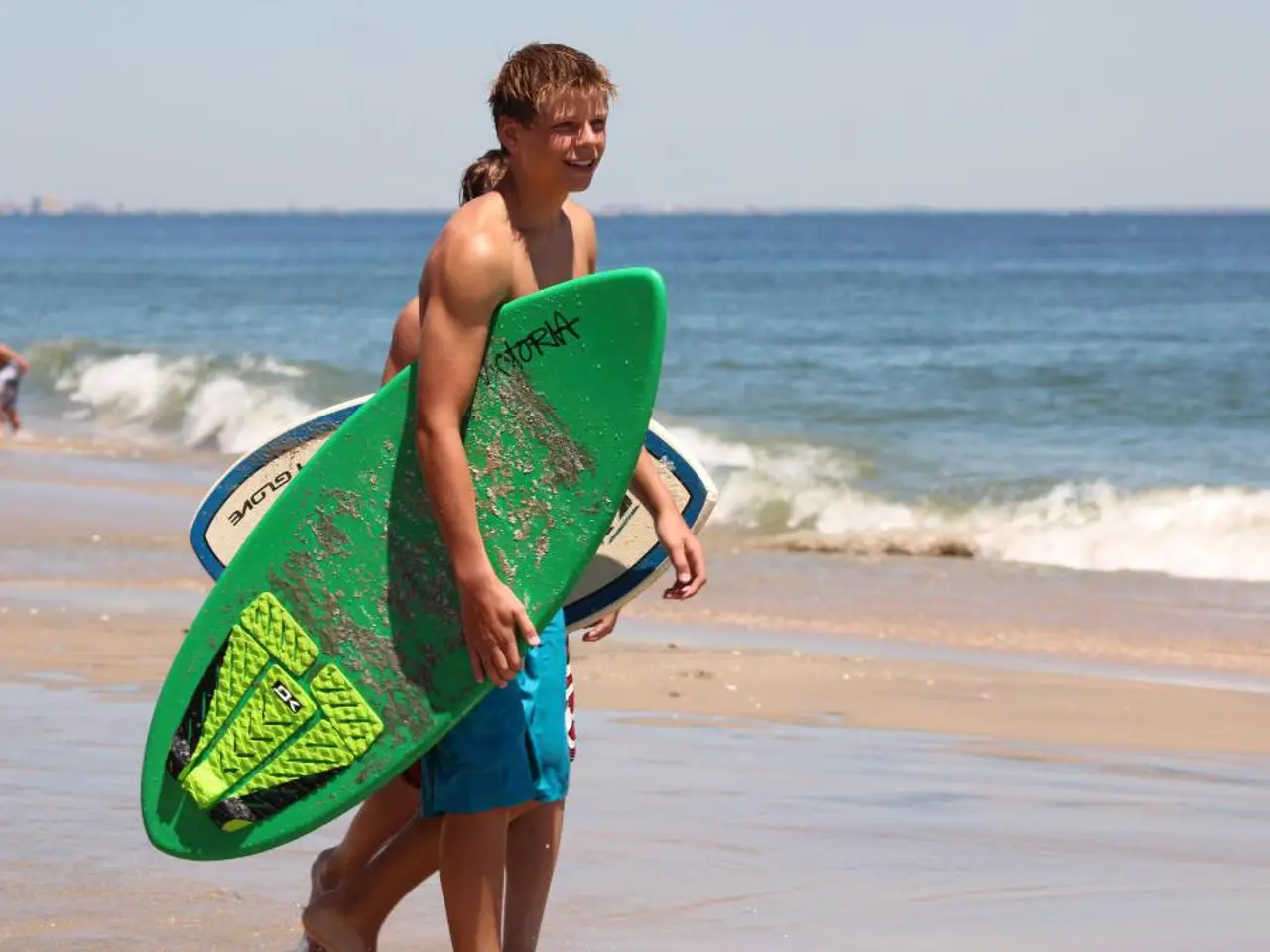Centuries-long immersion into the world of British surfing, showcased in an evocative exhibition
Cornwall's Surfing Legacy: A Century of Waveriding
Cornwall, a coastal region in the UK, has become a hub for surfing, art, and activism, thanks to its convoluted coastline and exposure to Atlantic swells. This rich history spans over a century, with the sport influencing various aspects of Cornish culture.
Sam Bleakley, a surf academic and curator, states that surfing has been shaping Cornwall for over 100 years. An exhibition titled 'SURF!' at the National Maritime Museum Cornwall showcases this influence, demonstrating how surfing has encouraged art, craft, and activism in the area for decades.
The exhibition, which opens on March 28, 2025, and runs until January 2027, features a recreation of Newquay's original Bilbo Surf Shop and an original 1965 VW Transporter campervan to capture the '60s vibe. It also showcases a wide variety of artboards, including works by Polly Morgan, Paul Smith, Julian Schnabel, Nina Blake, and James Otter. One artboard, engraved with poetry, is particularly noteworthy.
The exhibition also highlights how surf culture sparked activist movements in Cornwall, such as the environmental organization Surfers Against Sewage, founded in 1990 and campaigning to keep the UK's waters clean. It covers all aspects of surfing in the southern county of Cornwall, from the 1910s to the present day.
Surfing became more prominent in Cornwall in the early 20th century, although it was not widely practiced until the post-war period. The first recorded instances of surfing in Cornwall date back to the 1920s, with the earliest surfers often using makeshift boards. The sport gained more popularity in the 1950s as improved surfboard designs and better accessibility allowed more people to engage in it.
The 1960s and 1970s saw a significant surge in surfing's popularity in Cornwall. This period was marked by an influx of surfers from the UK and abroad, drawn by the region's consistent waves and stunning natural beauty. Surfing became integral to Cornwall's cultural identity, influencing local art and music. The sport also played a role in shaping the region's youth culture, with surfers often adopting alternative lifestyles and engaging in countercultural movements.
In recent decades, Cornwall has gained international recognition for its surfing. Locations like Newquay and Bude are renowned for their excellent surf conditions, hosting numerous national and international surfing competitions. The sport continues to shape local culture, with surfing festivals and events drawing large crowds and promoting tourism in the region.
However, the relationship between surf culture and tourism is complex. The influx of tourists and second-home owners has led to the displacement of locals in some areas. This issue is jokingly referred to as 'Falifornia' by locals.
The exhibition also features an archive of 100 surfboards that show the evolution of surfing in Cornwall over the last century. One of the surfboards in the collection is the world's biggest, which is 37-feet and can carry 15 surfers at once.
As surfing continues to evolve, it remains a vital part of Cornwall's heritage and a symbol of the region's connection to the sea. The 'SURF!' exhibition offers a comprehensive overview of this history and its impact on art, culture, and activism in Cornwall.
[1] Earthwave project at Polzeath beach, 2007. (n.d.). Retrieved from https://www.surfersagainstsewage.org/earthwave [2] The Generic Foiling Podcast. (n.d.). Retrieved from https://thegenericfoilingpodcast.com/
- The 'SURF!' exhibition, showcasing the impact of surfing on Cornwall's lifestyle and culture from home-and-garden design to sports analytics, will feature a diverse range of artboards by renowned artists like Polly Morgan, Paul Smith, Julian Schnabel, Nina Blake, and James Otter, delving into the sport's influence on the local art scene.
- Apart from its cultural significance, surfing in Cornwall has had a profound effect on sports and sports-analysis, as evidenced by the Earthwave project at Polzeath beach, focusing on ocean conservation and raising awareness about the role of surfing in enhancing coastal ecosystems, and The Generic Foiling Podcast, a platform dedicated to the analysis of hydrofoiling sports, a growing sector within the surfing community.





